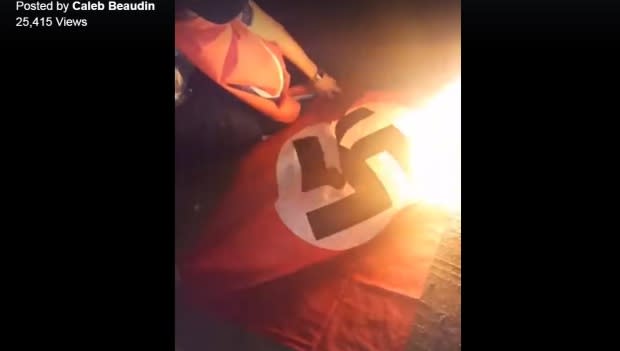He lived through a Nazi invasion. 79 years later, he saw a 'disgusting' Nazi flag go up in his Sask. village
Gerrit de Gooijer can look across his quiet street — the one with all the well-manicured lawns — and see the spot where the flag that curdled his blood was flying.
He first saw it on the afternoon of Friday, May 10. It happened to be exactly 79 years from the day the Nazis marched into his home country of the Netherlands and began starving and killing his people.
"How many soldiers fought for years, how many soldiers gave their life, and then [to] see that bloody flag hanging up there? That was disgusting," he said, the hard edge of anger in his voice.
The 92-year-old and his wife, Truus, live in Kelliher, Sask., a tiny village of just over 200 people that made national headlines when a Nazi and a Confederate flag were hoisted over a local house.
Not much more than a day after de Gooijer saw the flag, it was gone. A man from outside the community claimed credit on social media for taking the flags down, posting a widely viewed video of the Nazi flag burning.

Police have said they are investigating this burning, but de Gooijer said he just felt happy to see the eyesore gone.
He spent five years watching men who wore the Swastika on their uniforms and cars rounding up other men. De Gooijer's brother-in-law had only been married six weeks when he was sent by the Nazis to a concentration camp, where he died.
De Gooijer couldn't believe it when he heard that police said it was not illegal to fly the flag. After looking it up, he saw the Criminal Code prohibits willful promotion of hatred. To him, the Nazi flag is that and more.
Why have Remembrance Day and say, 'Lest we forget'? he asked.
"At the same time, we allow those flags up. That's impossible."

The flag's brief but fiery presence is a touchy subject in Kelliher. The mayor refuses to speak about what has happened, saying he and his council have decided not to comment further on an already-heated topic.
Their village has been branded as racist, with one news satire website posting a story about a Kelliher man getting more upset by a Blue Bombers flag than a Nazi one.
No one in the village has anything good to say about the flag. But there's another reason for the reticence, they say — and it comes from the house where the flag flew.
The home belonged to a community member, Steve Lekach, who died two years ago. His son and his wife live on a farm north of town, while his grandson and namesake lives in the home in the village.
A well-liked family
The family are well-regarded in the community, but residents believe that the grandson is troubled. He's described as someone who needs help. Multiple attempts by CBC to speak to the family were unsuccessful.
Local cafe owner Lisa Eggett said the family members who live on the farm were welcoming when she and her husband moved to the community. She was very surprised to see the flag flying at the house where the grandson lives.
"One person doesn't dictate this village. We're happy here," she said.
She added that the village is a multicultural one, where people get along.
"I think there's so many more important issues, that this should have been dead and gone."

For Frederick O'Soup, it's not that easy to dust off his hands and forget.
The teacher, who lives in the nearby Muskowekwan First Nation, heard about the flag on Thursday evening, the day before the story exploded on social media.
He drove to the town, located less than 20 kilometres away, to see it for himself.
"It really shocked me. It made me sick to my stomach."
He believes he was the first to report the incident to police.
For people to move on so fast like this didn't happen, it's upsetting. - Frederick O'Soup
"I don't know why this individual felt comfortable putting that flag out there. It represents so much hate and racism, I don't know why he felt it was OK to do that," he said.
"For people to move on so fast like this didn't happen, it's upsetting."
For O'Soup, the deep hurt caused by the flag can't be ignored. He's calling for Muskowekwan and Kelliher leadership to meet and see how to address the deep pain caused.
De Gooijer sees it as a bigger issue of leadership, one that goes beyond local politicians to Canada's parliament itself.
"I hope those people in government, they get their heads together, and bring in a law that forbids any flags of that nature. That's what I hope."
